-
 Bitcoin
Bitcoin $77,515.7878
-1.70% -
 Ethereum
Ethereum $1,482.0294
-4.71% -
 Tether USDt
Tether USDt $0.9993
-0.02% -
 XRP
XRP $1.8605
-1.92% -
 BNB
BNB $557.5428
0.65% -
 USDC
USDC $0.9999
0.00% -
 Solana
Solana $106.0273
-0.31% -
 TRON
TRON $0.2316
1.34% -
 Dogecoin
Dogecoin $0.1455
-1.79% -
 Cardano
Cardano $0.5752
-0.67% -
 UNUS SED LEO
UNUS SED LEO $8.9885
0.56% -
 Toncoin
Toncoin $3.0072
-0.71% -
 Chainlink
Chainlink $11.1124
-2.38% -
 Stellar
Stellar $0.2264
-1.93% -
 Avalanche
Avalanche $16.3598
-2.96% -
 Sui
Sui $1.9678
-2.51% -
 Hedera
Hedera $0.1506
1.67% -
 Shiba Inu
Shiba Inu $0.0...01079
-5.16% -
 MANTRA
MANTRA $6.1980
-1.37% -
 Polkadot
Polkadot $3.4898
-3.17% -
 Bitcoin Cash
Bitcoin Cash $273.8403
-0.99% -
 Dai
Dai $1.0001
0.01% -
 Litecoin
Litecoin $69.4915
-2.01% -
 Ethena USDe
Ethena USDe $0.9987
-0.01% -
 Bitget Token
Bitget Token $4.0390
-0.91% -
 Pi
Pi $0.5676
-3.21% -
 Hyperliquid
Hyperliquid $11.2615
1.74% -
 Monero
Monero $197.9224
-1.54% -
 Uniswap
Uniswap $4.9780
-2.59% -
 OKB
OKB $49.8015
-2.53%
Does speculation in the NFT market dominate the market?
Speculation drives NFT market volatility, with prices soaring and crashing due to hype, but genuine interest in art and utility also plays a crucial role.
Apr 06, 2025 at 11:14 pm
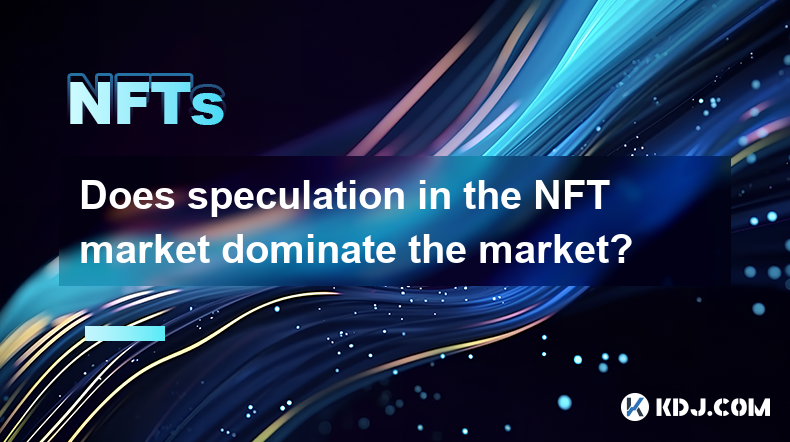
The NFT (Non-Fungible Token) market has experienced significant growth and attention in recent years, leading to debates about whether speculation dominates the market. Speculation in the NFT market involves buying and selling NFTs with the hope of profiting from price fluctuations rather than for their intrinsic value or utility. To understand the role of speculation, it's essential to examine the market dynamics, the behavior of participants, and the impact of speculation on NFT prices and market trends.
The Nature of NFTs and Speculation
NFTs are unique digital assets that represent ownership or proof of authenticity of a specific item or piece of content, typically on the blockchain. The novelty and potential for high returns have attracted many speculators to the market. Speculation can drive up prices and create volatility, as seen in the rapid rise and fall of certain NFT projects. However, not all participants in the NFT market are speculators; many are artists, collectors, and enthusiasts who value the art or utility of NFTs.
Market Dynamics and Speculative Behavior
The NFT market is characterized by a high degree of speculation, partly due to the ease of entry and the potential for significant profits. Speculators often focus on trending projects or those with high-profile endorsements, leading to rapid price increases. This behavior can create bubbles, where prices soar to unsustainable levels before crashing. For instance, the Bored Ape Yacht Club and CryptoPunks have seen significant speculative interest, with prices driven by hype and social media influence rather than intrinsic value.
Impact of Speculation on NFT Prices
Speculation can significantly impact NFT prices, often leading to inflated valuations. When speculators enter the market, they drive demand and push prices up, sometimes far beyond the perceived value of the NFT itself. This can be seen in the case of NBA Top Shot, where certain moments were sold for thousands of dollars due to speculative frenzy. However, when the market cools down, prices can plummet, leaving latecomers with significant losses. The volatility driven by speculation can deter long-term investors and create an unstable market environment.
Role of Speculators in Market Trends
Speculators play a crucial role in shaping market trends within the NFT space. They can drive interest in new projects, leading to increased liquidity and market activity. However, this can also lead to a focus on short-term gains rather than long-term value. For example, the rise of Art Blocks and its generative art NFTs was partly fueled by speculative interest, which helped establish the platform as a significant player in the market. Speculators can also influence the direction of the market by shifting their attention from one project to another, creating cycles of hype and decline.
Balancing Speculation and Genuine Interest
While speculation is a dominant force in the NFT market, there are also participants driven by genuine interest and passion for the art or utility of NFTs. Artists and creators often use NFTs to monetize their work and engage with a community of collectors. Platforms like Foundation and SuperRare cater to this segment, focusing on the artistic value rather than purely speculative gains. Balancing these two forces—speculation and genuine interest—is crucial for the sustainable growth of the NFT market.
Regulatory and Ethical Considerations
The high level of speculation in the NFT market has raised regulatory and ethical concerns. Regulators are increasingly scrutinizing the market to protect investors from fraudulent schemes and to ensure transparency. Ethical considerations also come into play, as the focus on speculation can overshadow the original intent of NFTs as a means for artists to gain recognition and financial support. Addressing these concerns will be vital for the long-term health of the market.
Case Studies of Speculation in the NFT Market
Several high-profile cases illustrate the impact of speculation in the NFT market. The Bored Ape Yacht Club saw its NFTs sell for millions of dollars, driven largely by speculative interest and celebrity endorsements. Similarly, CryptoPunks experienced a surge in prices due to speculation, with some punks selling for tens of millions of dollars. These cases highlight how speculation can drive prices to extraordinary levels, but also how quickly the market can shift when the speculative bubble bursts.
The Future of Speculation in the NFT Market
The future of speculation in the NFT market remains uncertain but is likely to continue playing a significant role. As the market matures, there may be a shift towards more sustainable models that balance speculation with genuine interest. New technologies and platforms may emerge to address the challenges posed by speculation, such as decentralized finance (DeFi) solutions that offer more stability and transparency. However, the allure of quick profits will likely keep speculation a central feature of the NFT market for the foreseeable future.
Strategies for Navigating Speculation
For participants in the NFT market, navigating speculation requires a strategic approach. Here are some strategies to consider:
Research and Due Diligence: Thoroughly research the projects and NFTs you are interested in. Understand the team behind the project, the utility of the NFT, and the market trends.
Diversification: Avoid putting all your funds into one NFT or project. Diversify your investments to spread risk and increase the chances of finding value.
Long-Term Perspective: Consider holding NFTs for the long term rather than engaging in short-term speculative trading. This can help you weather market volatility and benefit from the potential long-term growth of the project.
Community Engagement: Engage with the community around the NFT project. This can provide valuable insights and help you stay informed about developments that could impact the value of your NFTs.
Risk Management: Set clear risk management strategies, such as stop-loss orders or limits on the amount you are willing to invest in speculative assets.
Common Questions Related to Speculation in the NFT Market
Q: What is speculation in the NFT market?
A: Speculation in the NFT market refers to the practice of buying and selling NFTs with the primary goal of profiting from price fluctuations, rather than for their intrinsic value or utility. Speculators often focus on trending projects or those with high-profile endorsements, driving up prices in the hopes of selling at a higher price later.
Q: How does speculation impact NFT prices?
A: Speculation can significantly impact NFT prices by driving up demand and creating volatility. When speculators enter the market, they can push prices to unsustainable levels, creating bubbles that eventually burst. This can lead to rapid price increases followed by sharp declines, affecting the overall stability of the market.
Q: Can speculation be beneficial for the NFT market?
A: Speculation can be beneficial to some extent by increasing liquidity and market activity. It can draw attention to new projects and help establish them in the market. However, excessive speculation can lead to market instability and deter long-term investors, which can be detrimental to the sustainable growth of the market.
Q: How can investors protect themselves from the risks of speculation?
A: Investors can protect themselves from the risks of speculation by conducting thorough research, diversifying their investments, maintaining a long-term perspective, engaging with the community, and implementing risk management strategies. These approaches can help mitigate the impact of market volatility and speculative bubbles.
Q: Are there any regulatory efforts to address speculation in the NFT market?
A: Yes, regulatory bodies are increasingly scrutinizing the NFT market to protect investors from fraudulent schemes and ensure transparency. Efforts include monitoring for market manipulation, ensuring compliance with financial regulations, and addressing ethical concerns related to speculation. These measures aim to create a more stable and trustworthy environment for NFT trading.
Q: What role do artists and creators play in the NFT market amidst speculation?
A: Artists and creators play a crucial role in the NFT market by providing the content and utility that NFTs represent. While speculation can dominate market dynamics, many artists use NFTs to monetize their work and engage with a community of collectors. Platforms focused on artistic value, such as Foundation and SuperRare, help balance the speculative nature of the market by emphasizing the intrinsic value of NFTs.
Q: How might the future of the NFT market be shaped by speculation?
A: The future of the NFT market will likely continue to be influenced by speculation, but as the market matures, there may be a shift towards more sustainable models. New technologies and platforms could emerge to address the challenges posed by speculation, offering more stability and transparency. However, the allure of quick profits will likely keep speculation a central feature of the market for the foreseeable future.
Disclaimer:info@kdj.com
The information provided is not trading advice. kdj.com does not assume any responsibility for any investments made based on the information provided in this article. Cryptocurrencies are highly volatile and it is highly recommended that you invest with caution after thorough research!
If you believe that the content used on this website infringes your copyright, please contact us immediately (info@kdj.com) and we will delete it promptly.
- Pi Network (PI) Price Prediction for April 8: Will Pi Hit $3 Again?
- 2025-04-09 02:50:12
- $TAIKO listing on Revolut opens up 45 million new users to the first based rollup on Ethereum
- 2025-04-09 02:50:12
- Zcash (ZEC) Reaches a High of $35.69 as a Record Amount of Tokens Move Out of Circulation
- 2025-04-09 02:45:13
- The meme coin space is buzzing once again, and this time, it's not just about dogs, cats, or frogs
- 2025-04-09 02:45:13
- Celo Transitions from a Layer-1 Chain to an Ethereum Layer-2 Protocol
- 2025-04-09 02:40:13
- Binance Has Frozen $38 Million from a Market Maker Who Sold 66 Million Movement (MOVE) Tokens
- 2025-04-09 02:40:13
Related knowledge
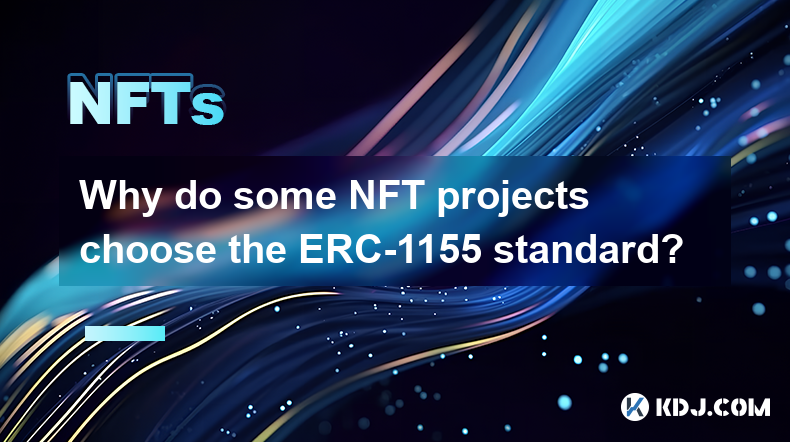
Why do some NFT projects choose the ERC-1155 standard?
Apr 08,2025 at 11:49am
The world of Non-Fungible Tokens (NFTs) has seen a significant rise in popularity and innovation, leading to the development of various token standards. Among these, the ERC-1155 standard has emerged as a versatile and efficient choice for many NFT projects. This article delves into the reasons why some NFT projects opt for the ERC-1155 standard, explor...
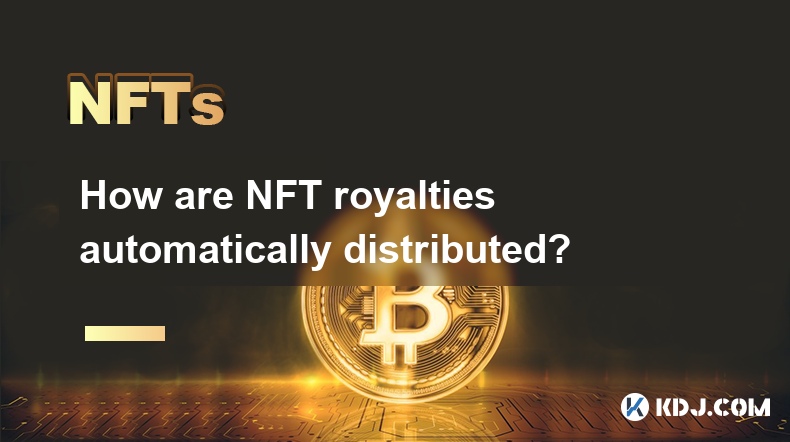
How are NFT royalties automatically distributed?
Apr 08,2025 at 08:14pm
NFTs, or Non-Fungible Tokens, have revolutionized the digital art and collectibles market by providing a way to prove ownership and authenticity of digital assets. One of the most intriguing features of NFTs is the ability to automatically distribute royalties to creators whenever their work is resold. This article will delve into the mechanisms behind ...
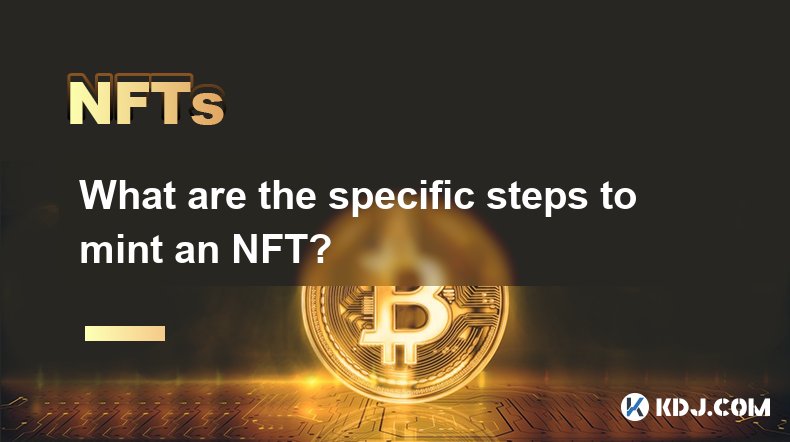
What are the specific steps to mint an NFT?
Apr 08,2025 at 05:22pm
Introduction to NFT MintingMinting an NFT, or Non-Fungible Token, involves creating a unique digital asset on a blockchain. This process allows artists, creators, and collectors to tokenize their work, ensuring its authenticity and ownership. Understanding the steps to mint an NFT is crucial for anyone looking to enter the world of digital collectibles....
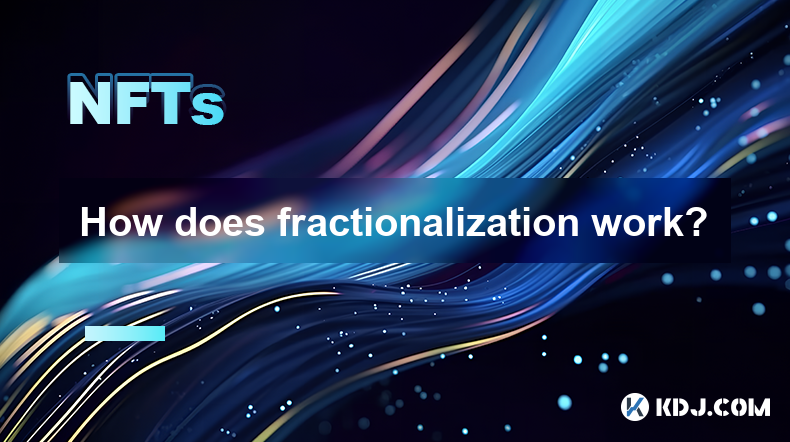
How does fractionalization work?
Apr 08,2025 at 07:42pm
How does fractionalization work? Fractionalization in the context of cryptocurrencies and blockchain technology refers to the process of dividing a single asset into smaller, more manageable pieces. This concept has revolutionized the way investors and users interact with high-value assets, making them more accessible and liquid. In this article, we wil...
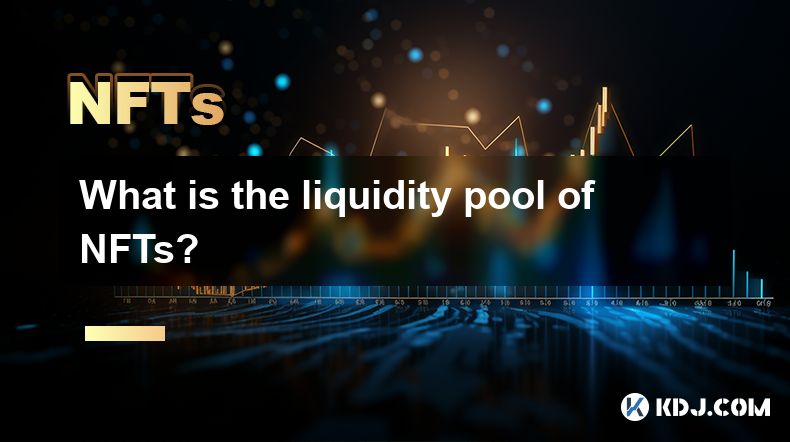
What is the liquidity pool of NFTs?
Apr 08,2025 at 05:35pm
The concept of liquidity pools has become increasingly popular within the cryptocurrency and decentralized finance (DeFi) ecosystems. While traditionally associated with token swaps, the idea has extended to the realm of Non-Fungible Tokens (NFTs). Liquidity pools for NFTs are mechanisms that facilitate the trading and exchange of these unique digital a...
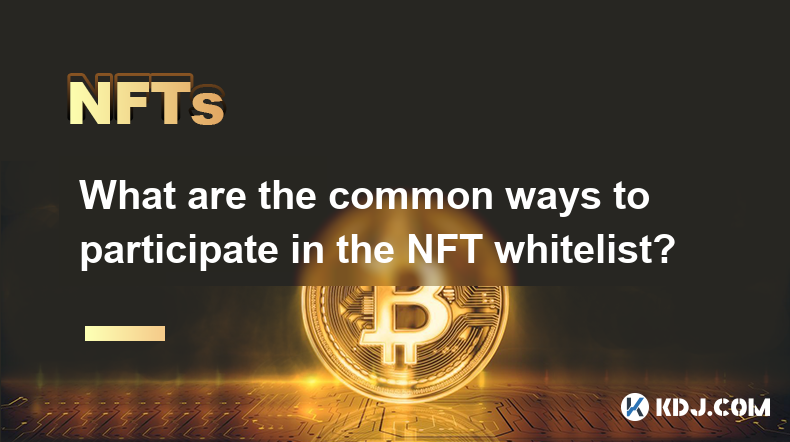
What are the common ways to participate in the NFT whitelist?
Apr 08,2025 at 08:28pm
Participating in an NFT whitelist can be an exciting opportunity for enthusiasts and investors looking to secure their spot in upcoming NFT drops. The whitelist often grants early access or special privileges, such as lower minting fees or guaranteed allocations. Here, we will explore the common ways to participate in an NFT whitelist, detailing each me...

Why do some NFT projects choose the ERC-1155 standard?
Apr 08,2025 at 11:49am
The world of Non-Fungible Tokens (NFTs) has seen a significant rise in popularity and innovation, leading to the development of various token standards. Among these, the ERC-1155 standard has emerged as a versatile and efficient choice for many NFT projects. This article delves into the reasons why some NFT projects opt for the ERC-1155 standard, explor...

How are NFT royalties automatically distributed?
Apr 08,2025 at 08:14pm
NFTs, or Non-Fungible Tokens, have revolutionized the digital art and collectibles market by providing a way to prove ownership and authenticity of digital assets. One of the most intriguing features of NFTs is the ability to automatically distribute royalties to creators whenever their work is resold. This article will delve into the mechanisms behind ...

What are the specific steps to mint an NFT?
Apr 08,2025 at 05:22pm
Introduction to NFT MintingMinting an NFT, or Non-Fungible Token, involves creating a unique digital asset on a blockchain. This process allows artists, creators, and collectors to tokenize their work, ensuring its authenticity and ownership. Understanding the steps to mint an NFT is crucial for anyone looking to enter the world of digital collectibles....

How does fractionalization work?
Apr 08,2025 at 07:42pm
How does fractionalization work? Fractionalization in the context of cryptocurrencies and blockchain technology refers to the process of dividing a single asset into smaller, more manageable pieces. This concept has revolutionized the way investors and users interact with high-value assets, making them more accessible and liquid. In this article, we wil...

What is the liquidity pool of NFTs?
Apr 08,2025 at 05:35pm
The concept of liquidity pools has become increasingly popular within the cryptocurrency and decentralized finance (DeFi) ecosystems. While traditionally associated with token swaps, the idea has extended to the realm of Non-Fungible Tokens (NFTs). Liquidity pools for NFTs are mechanisms that facilitate the trading and exchange of these unique digital a...

What are the common ways to participate in the NFT whitelist?
Apr 08,2025 at 08:28pm
Participating in an NFT whitelist can be an exciting opportunity for enthusiasts and investors looking to secure their spot in upcoming NFT drops. The whitelist often grants early access or special privileges, such as lower minting fees or guaranteed allocations. Here, we will explore the common ways to participate in an NFT whitelist, detailing each me...
See all articles






















































































